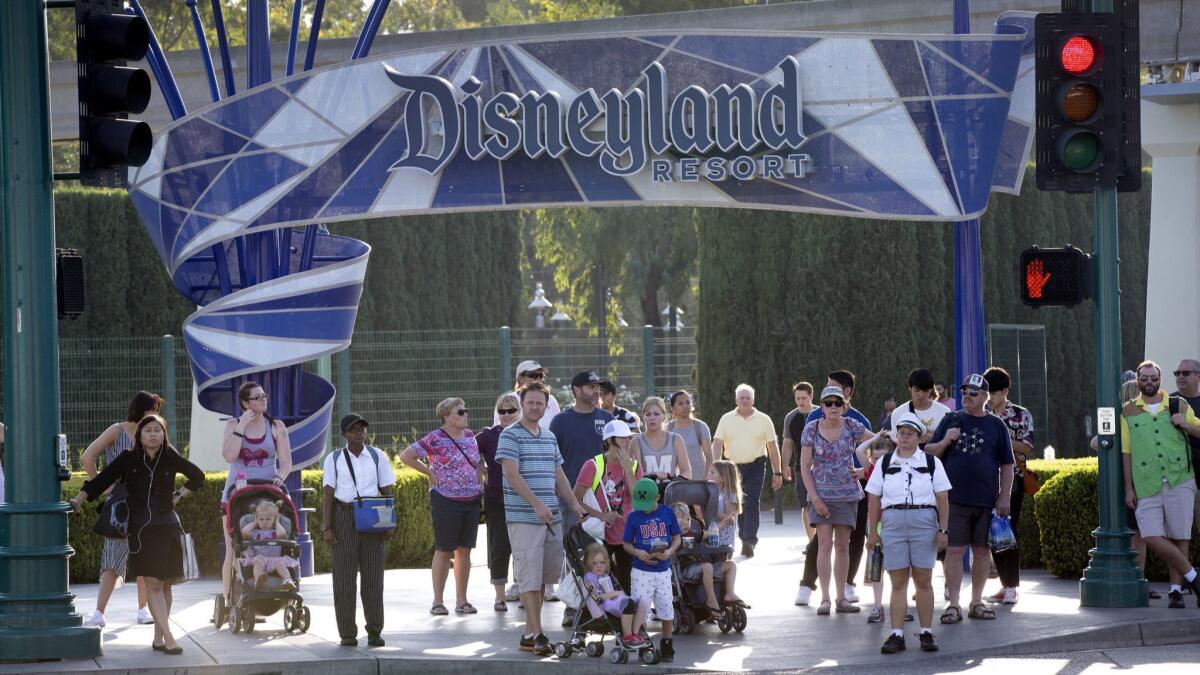Anaheim’s ‘living wage’ initiative is expected to pass. A business advocate calls it a ‘tragic outcome’

- Share via
Anaheim voters appear to have approved a ballot initiative that requires some hospitality businesses to pay workers at least $15 an hour, with 51.5% of ballots counted as of Monday cast in favor of the measure.
The Orange County Registrar of Voters warned, however, that more than 302,000 ballots remain uncounted throughout the county, although it wasn’t known how many of those ballots were from Anaheim. The county agency gets up to 30 days from the day after the election, which would be Dec. 6, to complete the count and certify the election results.
Supporters of Measure L said it would help thousands of workers who have been struggling to make ends meet.
Opponents conceded defeat, saying the Nov. 6 ballot measure backed by Disneyland Resort labor unions would deprive the city of future investments in hotels and other hospitality businesses.
Measure L, which was put on the ballot as the result of a petition drive by union workers, would require hospitality businesses that get a city tax subsidy to pay workers an hourly wage of at least $15 starting in January, increasing $1 an hour each year until 2022, when the wage would be tied to the cost of living.
The election drew more than $7 million in contributions for and against Measure L and to support candidates hoping to fill the position of mayor and three council seats. Walt Disney Co., through Disney Worldwide Services, donated at least $1.6 million to candidates and city ballot measure campaigns; labor groups, led by Unite Here Local 11, contributed $1.9 million to candidates and to support Measure L.
Todd Ament, chief executive of the Anaheim Chamber of Commerce, said in a statement that the latest election results indicate that Measure L will pass. He painted a dire scenario for the city, saying the higher wages will probably chase off future hospitality projects.
“This is a tragic outcome for Anaheim,” he said. “The special interests pushing Measure L lied to voters and tricked them into thinking this flawed measure will help many Anaheim workers. Time will show the voters the truth.”
But a union spokesman called Ament’s gloomy predictions “laughable.”
Andrew Cohen, a spokesman for Unite Here Local 11, a union that represents hotel workers in Anaheim, said living wage measures have helped workers in other cities that have adopted them.
“We are confident about the positive effects it will have on thousands of workers in Anaheim who are going to benefit,” he said.
Supporters and opponents of the measure still disagree on which businesses would be obligated to pay the higher wages.
Anaheim City Atty. Robert Fabela said the measure would apply to two luxury hotels under construction and a completed shopping district — all of which have agreed to accept a city tax break. Two other luxury hotel projects that are in the planning phase would also have to comply with Measure L.
But Fabela said he doesn’t believe the measure applies to the Disneyland Resort because the city ended two tax subsidy agreements with the resort in August.
Unions backing Measure L dispute Fabela’s conclusion, saying a 1996 agreement under which the city of Anaheim sold construction bonds to build a $108-million parking garage for the Disneyland Resort meets the definition of a city subsidy. Both sides agree that the dispute over whether Measure L applies to the resort will probably be settled in a courtroom.
A Disneyland representative issued a statement Monday, saying: “We continue to believe that wage discussions should take place at the bargaining table, where we have successfully reached agreements with several unions that will pay the majority of our frontline cast members a leading hourly wage of $15 or more, well before California’s wage requirements.”
To read more about the travel and tourism industries, follow @hugomartin on Twitter.
UPDATES:
5:30 p.m.: This article was updated with the latest number of uncounted votes and percentage of yes votes. It also contains a statement from Disneyland.
This article was originally published at 3:40 p.m.
More to Read
Inside the business of entertainment
The Wide Shot brings you news, analysis and insights on everything from streaming wars to production — and what it all means for the future.
You may occasionally receive promotional content from the Los Angeles Times.










